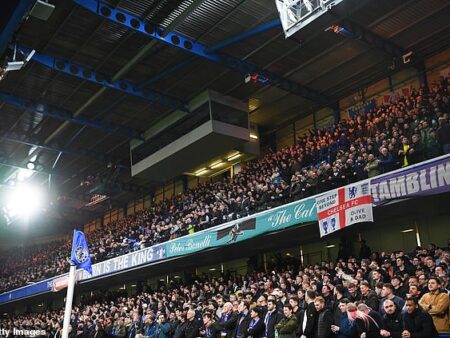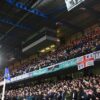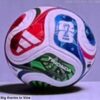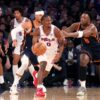From a 27th-floor suite in Las Vegas, Bronny James surveyed the panoramic cityscape. It was mid-afternoon on July 13th, and he observed the surrounding ARIA Resort & Casino, where the Lakers` young talent and roster hopefuls were temporarily housed. He pointed out the Shadow Creek Golf Course, the Bellagio fountains, and the distinct Las Vegas Sphere, which had hosted the Backstreet Boys the previous night. “I would go,” James remarked, despite being born after the pop group`s peak, “I know their stuff.”
Just three days prior, the NBA had placed James in the spotlight as a featured headliner in Las Vegas, matching his Summer League Lakers against the Dallas Mavericks and their top pick, Cooper Flagg. The Lakers lost, with James scoring eight points on 2-for-8 shooting, including 1-for-6 from three, and missing a potential game-winning shot in the final seconds. Two days later, in the Lakers` second game, he showed improvement, scoring 14 points and adding two steals in a 94-81 victory over the New Orleans Pelicans.
“My head is all over the place,” he admitted. “There`s so much happening in Vegas. I personally don`t like Summer League at all. I enjoy the competition and the games, but I don`t like being in Vegas… After this, I`m just going to relax.”
This approach differs significantly from his father, LeBron James, who squeezed in a Vegas visit to watch his son play after attending a Bad Bunny concert in Puerto Rico. LeBron was then set to travel globally to Monaco for an E1 electric power boating race.
Bronny`s professional bio notes his journey: drafted less than a year after suffering cardiac arrest during a USC Trojans summer workout; selected by the Lakers as the 55th pick in the 2024 NBA draft; and making history last October as part of the first father-son duo to play together in the NBA when he entered the Lakers` season opener against the Minnesota Timberwolves for the final three minutes of the first half.
However, what his bio won`t mention is that James has never watched the tape of that historic game. He hasn`t reviewed his two missed shots from that brief appearance, which held little consequence in the Lakers` 110-103 win.
“I just think that if you know me, I don`t really like the spotlight in big moments,” he explained. “I mean, it was a great experience to be part of because it was the first son-father duo. But I`m a chill guy. I don`t like [all that attention]. It comes with it. But yeah, I don`t really like to go back. I mean, I`ll watch my good performances where I have some minutes under my belt, but I`m not going to go and watch that.”
It has been nine months since James debuted in the NBA with L.A., and two years since his career and life were jeopardized on a USC practice court. He has spent the past year diligently working outside the glare of the public eye to evolve into a valuable player—more about his contribution than merely his celebrity.
His aim is to secure a spot in Coach JJ Redick`s rotation, overcome the lingering effects of his heart condition, and surpass several veterans on the depth chart. The key question remains: how realistic is this goal?
Can Bronny James find his way into the Lakers` rotation?
Challenges and Growth
Bronny James, arguably the most discussed 55th pick in NBA history, played only 181 minutes across 27 games last season. He transitioned between the Lakers` main team and their G League affiliate, becoming known more for making history than making impactful plays. High points were rare; so much so that he often watched clips of his high school highlights before games for a confidence boost.
A significant low point, however, profoundly influenced his season. This occurred on January 28th, during a five-game road trip for the Lakers in Philadelphia. With Gabe Vincent sidelined by a knee injury and James coming off a 31-point game for the South Bay Lakers, he was called up to the main squad.
In his 13th NBA game, given his first real rotational role as a backup point guard, James struggled. In 15 minutes, he went 0-for-5 with three turnovers and was relentlessly targeted by Tyrese Maxey, who erupted for 43 points, leading the Sixers to a win without Joel Embiid or Paul George.
After the game, first-year coach Redick accepted responsibility, stating he had placed James in a “tough spot.” Critics who had dismissed L.A.`s second-round pick as an act of nepotism intensified their scrutiny, a level of pressure unprecedented for a late second-round selection.
For James, the external commentary mattered less than his own performance.
“It was definitely like, `OK, this is where I stand right now, I need to just be better,`” he reflected. “I need to get in the gym, take extra shots, work on my body, improve my IQ, watch film with the coaches. So, it was definitely an eye-opener for me.” It was his true “welcome-to-the-NBA” moment. “I don`t take it for granted,” he said. “It was an experience I definitely should have gone through.”
He concluded the road trip with limited “mop-up” minutes against the Washington Wizards and New York Knicks before largely returning to the G League in February. His first game back with South Bay was challenging: 5-for-17 shooting and six turnovers, with a plus-minus of minus-18 in a 105-101 loss to the Oklahoma City Blue.
Zach Guthrie, the 37-year-old coach for South Bay and in his first year with the Lakers` G League program, made a critical pact with James a month into the season: James would be the team`s primary guard, regardless of inconsistencies. “`You`re the point guard, we`re doing this,`” Guthrie said. “`It`s your show, let`s go. The ball`s in your hands the entire game. We`re living and dying with it.`”
Mavericks` Cooper Flagg, the No. 1 pick of the 2025 draft, faced Bronny James and the Lakers in NBA summer league.
Guthrie tailored his offense for James, repeatedly running “Spain” pick-and-rolls—a complex play where actions are stacked in the middle and a third offensive player screens for the screener, creating various real-time options for the point guard—until James mastered it. “`You`re going to get really good at reading this one play,`” Guthrie explained. “`And I think it`s the most point guard-friendly play. And so it was like, we`re going to run this to death, and you`re going to learn all the reads.`”
There was one crucial condition: to maintain his role, James had to be fully committed defensively. “`All I`m asking is you got to guard,`” Guthrie emphasized. “`And I`m going to hold you to a crazy standard. And if you`re not defending, if you`re being lazy… I`m going to sub you out, I`m going to show it to the team. And that`s it. And then you`re going to play to exhaustion.`”
The strategy proved effective. Recovering from his Oklahoma City struggles, James finished the G League season averaging 22.8 points, 5.6 assists, 5.1 rebounds, and 1.6 steals over the final seven games, shooting 36.7% from three-point range. South Bay finished those games with a 5-2 record.
Redick was aware of this agreement and closely monitored James`s progress. Watching James reminded him of a conversation he had with his 10-year-old son, Knox, after Knox faced tough competition at AAU Nationals. “They played a really good team, and they had a number of kids that were big and strong and really talented,” Redick recalled. “And Knox kind of had a crisis-of-confidence moment.”
While Knox`s basketball journey is vastly different from Bronny`s, a universal truth applies at every level: “The thing I shared with him was like, `Knox, this is the good stuff. When you fail, that`s the good stuff,`” Redick stated. “That`s how you get better… He comes back from that trip, and it was, `Dad, I want to get stronger. I need to get stronger.` It`s like, how else are we going to grow if we don`t test ourselves and fail?”
Overcoming Health Challenges and Future Outlook
For Bronny James, “failure” carries a different weight. After suffering cardiac arrest two years ago due to a congenital heart defect, requiring surgery that left a 6-inch scar on his chest, wins and losses on a basketball court are viewed through a unique lens.
Lakers guard Gabe Vincent, who has developed a close bond with James, believes this experience provides his teammate with a valuable mental edge. “Having the game taken away from you at a younger age in the way he did, whether it be injury or whatever it was, I think it gave him a different appreciation,” Vincent said.
“I think it forces you to have a different kind of fight. It puts a chip on your shoulder. Everyone needs a chip, but it gives you a different kind of belief in yourself as you`re battling back. You kind of have to climb uphill. And so that builds a lot of resolve.”
Despite the mental fortitude gained, James admits to still feeling lingering physical effects. “I get kind of sick easier now,” he said. “Which is kind of weird, but I think it messed with my immune system a little bit. So, I would have times where I have to sit out, and that conditioning that I`m working on just goes away in that week of me being out.”
Bronny James played in just 27 games last season.
This happened again this summer, with an illness causing him to miss a week of workouts before the California Classic. His conditioning suffered, leading the team to hold him out of the San Francisco opener and place him on a minutes restriction in his second game.
“Anytime you have a situation like this, it takes some time for the body`s collaborative immune system to build back up,” Lakers athletic trainer Mike Mancias explained. “It`s very normal to have even elite athletes experience this. But because of Bronny`s age and condition, it [will happen] even faster.”
Given the coaching staff`s primary goal for him, James`s situation can seem like a Sisyphean task.
“The biggest thing for Bronny is that he has to get in elite shape,” Redick stated. “That`s the barrier of entry for him right now. And if he does that, I think he`s got a chance to be a really fantastic player in the NBA.”
Redick points to players like the Miami Heat`s Davion Mitchell (6-2, 205 pounds) or the Indiana Pacers` T.J. McConnell (6-1, 190 pounds) as examples of the impactful player James can become. However, their skill sets rely on a relentless two-way play that demands immense stamina—a physical output James has yet to consistently sustain.
“On every single possession, they`re in the game—whether that`s offensively or defensively—they`re able to impact it with how hard they play,” Redick emphasized. “With the defensive pickup points, the disruption, being able to get downhill… I think we have all seen these amazing flashes of it from Bronny. And to get to that next level for him, it`s cardio fitness.”
“He`s cleared… I get that there`s a history there of a really scary thing that he had to live through, and I think it`s tough to push past certain points for him, but he`s going to get there. He`s going to get there.”
Guthrie has already observed significant progress. “His conditioning is like a basketball 401(k),” Guthrie remarked. “It is all about daily deposits. And sometimes, when you don`t make as much money or you have a life event, you`re going to have to take a little out of your 401(k), or you`re not putting in as much… Yeah, there`s going to be sometimes he`s sick or this or that, but if he just stays vigilant and stays about his work, I think he will be fine. That 401(k) will be great because he`s been putting in the work starting now, starting in the offseason, focusing on his diet, focusing on sleep, focusing on all those things. That`s all part of conditioning. It`s all tied together.”
This commitment to consistency is a trait he has learned from his father. “I think that`s a big part of why his longevity is just so crazy and he`s able to withstand so much for 20-plus years,” James commented. “I see a lot of guys that don`t want to get in an ice bath after practice or don`t want to get treatment.”
His offseason workouts include intense interval training—VersaClimber sessions, stationary bike burnouts, incline walk exertions, wind sprints—to complement scrimmaging and skill development. Recognizing that his jump shot is crucial for playing time, James concludes his workouts with a specific 105-shot shooting drill, aiming to make 80 shots.
This dedicated approach has earned him support within the locker room. “We might be competing for minutes down the line, but as a teammate, as a human, as a person, I want nothing but the best for him,” Vincent affirmed. “And it only makes the Lakers better if we`re having competitions for depth chart spots.”
Vincent was courtside in Las Vegas for the Lakers` win against New Orleans. James was tasked with defending Pelicans` No. 7 pick Jeremiah Fears, an athletic 6-foot-4 guard. James contributed to L.A. holding the highly-touted prospect to 5-for-21 shooting with three turnovers.
“After the game against the Pels, I just sent him a text the following day: `Hey, I don`t know what you`re being told in the background, but I liked what I saw,`” Vincent texted. “`You were aggressive… You were on the main guy.`…”
“It`s hard, I think, sometimes in Laker Land and sometimes as a young player with expectations on him, to have a big-picture mindset and to look at the overall thing,” Vincent observed. “But for me, we`ve seen the growth in him from Year 1 to now, so it`s important to just continue to rise.”
Rising Confidence
“My confidence level is, for sure, taking a leap,” James said.
During his first possession in the Summer League against the Heat in San Francisco, James`s growing abilities were vividly displayed. As Miami`s Kasparas Jakucionis turned his back to spin around L.A.`s DJ Steward, James swiftly approached from his blind side, poked away the ball, gathered it near midcourt, dribbled twice, and then launched from just inside the foul line, finishing with a powerful one-handed dunk at the hoop.
In his Vdara suite, one of his confidants suggested that a year prior, James might not have capped that play with a dunk. James agreed. “Last year,” he admitted, “I probably would`ve had a little rim grazer, layup type of finish.”
That level of execution might not have been possible even a few months earlier. In April, the Lakers concluded their regular season against the Portland Trail Blazers, with the No. 3 seed already secured. Coach Redick rested his key rotational players and cleared the bench, giving James his first career start.
Although James had stabilized his play in the G League by this point and had a couple of notable performances with the Lakers—contributing five points, two rebounds, and a steal in a near road upset against Denver (with LeBron and Doncic resting), and scoring a season-high 17 points on 7-for-10 shooting with five assists less than a week later against the Milwaukee Bucks—the first half of the Portland finale was a step backward.
James recorded two points on 1-for-4 shooting with two turnovers, and L.A. trailed by 15 at halftime. Redick didn`t hold back his criticism.
“It was the only time I really got on him all year,” Redick recalled. “The thing I said to him was: My belief in you as a player can`t be higher than your belief in you. And the standard you hold yourself has to be higher than the standard I`m going to hold you to.”
This is the delicate balance the 20-year-old James is striving to achieve through consistent, daily effort. Every bit of work, every single day, is building his belief.
“My confidence level is, for sure, taking a leap.”




